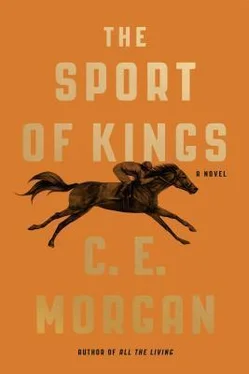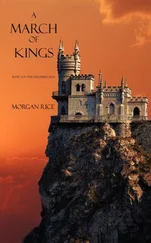Lou thought to soothe her, wanted to say: Don’t worry. My mother filled my head with all sorts of fears — how she bled, how she was cut and couldn’t feel pleasure properly afterwards, and how her last, which was me, had led to a hysterectomy. But all Lou said was, “Hang in there, sweetheart. It’s worth it. I ended up with a child I love more than I love myself. She’s one of the best things that ever happened to me.”
They were some way down the Paris — Lexington Road when Henrietta was once again clenched over her belly, deep in communion with this emergent, wrestling thing. She lost her sense of travel, of Lou at her side. Her baby argued viciously with her body, and she grimaced in complicated pain over it. When the baby’s demands eased, she laid her damp head on the headrest and looked out at the virginal white barns, the cupolas with their vanes pirouetting in an insistent wind, the horses with tangled manes fallen over bulbous eyes. History like floodwaters swamped them to the pupils. The stone walls began to totter and disintegrate even as she looked; the karst caved into sinks and ponds, and she laughed again through the pain, atop the pain, in the face of what was to come.
She saw Kentucky as a land of country contentments, rolling like an ocean in the sights of a ten-gun brig. The ocean reveals the most distant, dazzling islands to honest ships only after strenuous searching — by that worst journey, which is the ascetic’s choice. A midshipman’s boat is a cell, and a cell is the mind’s spyglass. You are a measurer of the winter farrow and summer effulgence and everything in between: girl turned fearless sailor. When you grow up and become a mother, never forget the delightful, early days of discovery. Remember the green, milky constancy of the ocean, the sturdy ship of your body with unsuckled breasts masthead to the wind, how you spied green, glossy life on basalt shores, how birds trilled the infinities for you. Remember how you journeyed in your body across the world only to discover that you were the original uncharted topography.
Disconcerted by Henrietta’s laughter, Lou said, “Are you breathing? Are you keeping your breath deep and even?”
“Yes,” with irritation now, “yes!” She was breathing out the last of the Old Dominion air her father had blown into her lungs and looking past the farthest row of white plank fencing: the rolling bluegrass has turned to bottle-green waves, and she can see ten volcanic islands rising in the wriggling heat. This is fresh, unknown land and so beautiful, though the islands appear to be divided, barren, and lava-scarred below the hanging clouds and above, ensconced in the damp humor of the heights, crudely efflorescent with life. As they draw near the first mass of land, she can see, amidst the many black conicals, reptiles hissing and dull-colored birds who care no more for her than they do for the great tortoises.
My God, the great tortoises! Heavy, lumbering giants. The second island is striated with crisscrossing blazes that the ponderous beasts have cut across the sloping green hillsides. Tiring of succulents in the fire-pit districts, the tortoises travel day and night for water, their crepey heads thrust before them up the precipitous slopes until they discover the springs where their kin are just now returning, moving with the stolid gait of those obedient to nature. They pass one another as they’ve passed before and will pass again. Now, the newly arrived slip into the crystalline pool past their heavy-lidded eyeballs to drink and drink and drink.
Henrietta’s guts reached around her lower back and wrenched hard. The grip was so strong, so quick on the last that Lou, who had been watching the dash clock, said, “That was awfully fast.” Henrietta’s answer was silence, because it was too strong for words. Now there was no doubt in Lou’s mind: The child wanted out. And soon.
Lou’s voice was calm but urgent. “Henrietta, I think you may have been in labor for the last couple days. You may be active right now. Promise me that if you feel the urge to push, you’re going to resist. Okay? We’re almost there, so just hang on.”
Henrietta wasn’t listening. The sea of volcanic islands came to an abrupt end, and the city flashed before her with its gaudy distractions — aluminum siding, pocked roofing, garish billboards, trash aflutter in the streets. Yet, there were still snatches of green grass under the vivid noon. Century-old trees with ancient memory. And there, perched on roofs and wires, arcing over the truck, commenting upon the sprawling growth of the city, were the daring little perspicacious finches, dull but quick, at first darting at the corner of her eye, then everywhere she looked congregating on porches and porticoes, strutting for worms and berries, swooping on the wing, staring black-eyed into the truck. They were of a family, yet they varied enormously, thirteen species all peculiar to the various neighborhoods of the city. Amazing how tame they are, how unafraid, so this one — with its abrupt tail and modest beak; Geospiza parvula , so tiny and pert — alights on her hand, and after observing it a while in curiosity and admiration, Henrietta snuffs its life with a single blow. Now she opens its chest with the obstetrician’s scalpel, while all its kin crowd around, perching on the hood of the truck, the ashtray, on her shoulders, observing with beady curiosity as she makes her careful incisions. The feathery flesh is spread, showing the small veiny networks and coiled viscera. The finches chatter with great vivacity, their talk overwhelming the honking horns, the squealing tires, the radios, as she cracks open the fragile rib cage and exposes the organ of animation. Like a wet treasure, here is the mystery. It’s too hot to touch with her hands. Now she realizes that along with its endlessly varying kin, the dead bird is still singing, its throat pulsing with blood and sound, and that the song is for her.
She lays the carcass down and is fully persuaded. Hadn’t she always been like a ripe fruit even when life was hell? It was perhaps true that she had never been happy, but happiness was a cheap, ephemeral thing brought on by novelty or chance; happiness was a trinket from a fair; inevitably the fair moved on, and the trinket was broken, stolen, or lost. Only joy abided. It was like blood, and as long as blood flowed, joy flowed, intrinsic to the organism. She looked at the wild and abundant world, the new and old species forever mutating, the violent sun and its cool hanger-on the moon, which she knew remained in the sky uncaring whether seen or unseen. She had joy. If you carry a hardy pagan god in you, no parent or enemy can kill it. She realized with surprised relief that someday in the distant future when this day of great pain was long past, they could raise a monument over her bleaching bones that read: Accomplished.
And that was her last thought before the work of her body engulfed her and this time would not let go. In the midst of that overriding pain, hands were trying to ease her out of the truck — were they at the hospital already? — yet she couldn’t uncurl, her body wouldn’t allow it, so they brought a gurney and now Henry was before her, his beloved face twisted with worry the way her guts were twisted.
“I’m here, I’m here,” he said as they eased her onto the gurney. They were wheeling her now, Henry trotting along at her head, listening to her moan, “It won’t stop.”
“Your contractions won’t stop?” But her answer was an animal’s panting and groaning, her hands a knobby lace over her distended belly. Henry saw how her hands were distorted with swelling. In these last weeks, her skin had been scorched by itching. Her belly, too big for her slim frame, was bursting like a late-season watermelon. It stretched so taut that raw fissures opened, and he was sick with guilt. In the unnaturally aseptic light of the hospital corridors, he was stricken with the memory of when they had first handed her to him swaddled in a pink cotton blanket. This is mine? he had thought. I made this miracle happen?
Читать дальше
Конец ознакомительного отрывка
Купить книгу












